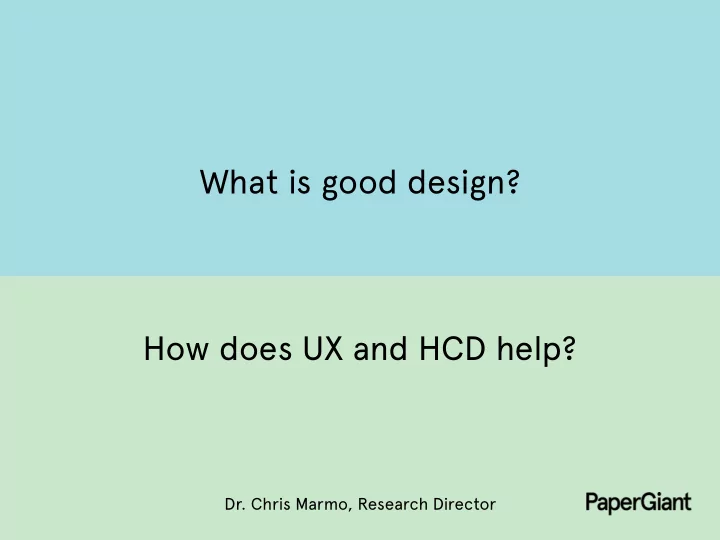

What is good design? How does UX and HCD help? Dr. Chris Marmo, Research Director
Hello, I’m Amanda Chris.
PaperGiant We’re a strategic design We do things like: consultancy that User research - helps organisations User experience design - understand and solve Service design - complex problems. Organisation design - Capability building - Digital development - www.papergiant.net
What is good design?
Good design is not : - Aesthetics - Fashion - Style - Branding - Graphics - ‘Creative’
Good design is adaptive, and works at many scales Stewart Brand
Good design is adaptive at scales – 1. Interfaces 2. Environments 3. Journeys 4. Infrastructure 5. Policy
Good design is adaptive at scales – 1. Interfaces 2. Environments 3. Journeys 4. Infrastructure 5. Policy
1. Interfaces Good design is : - Accessible: The interface can be used by screen readers, on many devices. - Navigable: It’s clear where you can go, where you are, and where you’ve been. - Consistent: Things that are the same look the same, work the same. - Responsive: Gives user’s intelligent options and respects choices. - Recoverable: When an unavoidable errors occur, it makes it easy to recover. - Plain: Plain language, spare design.
Good design is adaptive at scales – 1. Interfaces 2. Environments 3. Journeys 4. Infrastructure 5. Policy
2. Environments Good design is : - Designed for context: understands the places it will be used. - Systems thinking: recognises it’s just one tool amongst many to help someone do a job. - Multi-channel, many touch-points: might be used through different form factors, across different places. - OK with mess: real life means ad-hoc practices, work-arounds and improvisations.
Good design is adaptive at scales – 1. Interfaces 2. Environments 3. Journeys 4. Infrastructure 5. Policy
3. Journeys Good design: - Changes: with people, over time. - Knows where it’s aiming : in regards to impact within journey stages. - Interacts with other systems: when you take a first-person perspective, the lines between products and services are hard to spot.
Good design is adaptive at scales – 1. Interfaces 2. Environments 3. Journeys 4. Infrastructure 5. Policy
How does UX and UCD help?
UX and HCD gives 1. Identify real needs us the methods – 2. Continuously assess 3. Prototype solutions 4. Democratise decisions 5. Imagine Futures
1. Identify real needs - Grounded: in real stories and scenarios. - Compelling : observations, and particularly quotes, are hard to ignore.
UX and HCD gives 1. Identify real needs us the methods – 2. Continuously assess 3. Prototype solutions 4. Democratise decisions 5. Imagine Futures
2. Continuously assess - User testing: advocates for continuous validation and evaluation. - Hypothesis forming: teaches us that design is about asking questions, as well as providing solutions.
UX and HCD gives 1. Identify real needs us the methods – 2. Continuously assess 3. Prototype solutions 4. Democratise decisions 5. Imagine Futures
3. Prototype solutions - Accessible: HCD methods make it easy for anyone to tell their story and make suggestions. - Visible: It gives people a chance to make invisible parts of their lives visible, through different forms of communication.
UX and HCD gives 1. Identify real needs us the methods – 2. Continuously assess 3. Prototype solutions 4. Democratise decisions 5. Imagine Futures
4. Democratise decisions - Tangible choices: User- centred design techniques make both problems and solutions tangible. - Malleable decisions: once tangible, people have a better chance at shaping outcomes.
UX and HCD gives 1. Identify real needs us the methods – 2. Continuously assess 3. Prototype solutions 4. Democratise decisions 5. Imagine Futures
5. Imagine futures Good design gives people the tools to imagine alternatives, and to design a future for themselves.
Thanks! chris@papergiant.net @kurisu @hellopapergiant www.papergiant.net
Recommend
More recommend